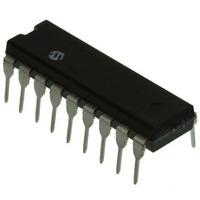PIC16F88-E/P Microchip Technology, PIC16F88-E/P Datasheet - Page 298

PIC16F88-E/P
Manufacturer Part Number
PIC16F88-E/P
Description
IC MCU FLASH 4KX14 EEPROM 18DIP
Manufacturer
Microchip Technology
Series
PIC® 16Fr
Datasheets
1.PIC16F616T-ISL.pdf
(8 pages)
2.PIC16F688T-ISL.pdf
(688 pages)
3.PIC16F818-ISO.pdf
(6 pages)
4.PIC16F87-IP.pdf
(228 pages)
5.PIC16F87-IP.pdf
(8 pages)
6.PIC16F87-IP.pdf
(4 pages)
7.PIC16F87-IP.pdf
(8 pages)
Specifications of PIC16F88-E/P
Core Size
8-Bit
Program Memory Size
7KB (4K x 14)
Core Processor
PIC
Speed
20MHz
Connectivity
I²C, SPI, UART/USART
Peripherals
Brown-out Detect/Reset, POR, PWM, WDT
Number Of I /o
16
Program Memory Type
FLASH
Eeprom Size
256 x 8
Ram Size
368 x 8
Voltage - Supply (vcc/vdd)
4 V ~ 5.5 V
Data Converters
A/D 7x10b
Oscillator Type
Internal
Operating Temperature
-40°C ~ 125°C
Package / Case
18-DIP (0.300", 7.62mm)
Controller Family/series
PIC16F
No. Of I/o's
16
Eeprom Memory Size
256Byte
Ram Memory Size
368Byte
Cpu Speed
20MHz
No. Of Timers
3
Lead Free Status / RoHS Status
Lead free / RoHS Compliant
For Use With
ACICE0202 - ADAPTER MPLABICE 18P 300 MIL
Lead Free Status / RoHS Status
Lead free / RoHS Compliant, Lead free / RoHS Compliant
- PIC16F616T-ISL PDF datasheet
- PIC16F688T-ISL PDF datasheet #2
- PIC16F818-ISO PDF datasheet #3
- PIC16F87-IP PDF datasheet #4
- PIC16F87-IP PDF datasheet #5
- PIC16F87-IP PDF datasheet #6
- PIC16F87-IP PDF datasheet #7
- Current page: 298 of 688
- Download datasheet (3Mb)
PICmicro MID-RANGE MCU FAMILY
17.4.1.2
DS31017A-page 17-22
Slave Reception
When the R/W bit of the address byte is clear and an address match occurs, the R/W bit of the
SSPSTAT register is cleared. The received address is loaded into the SSPBUF register.
When the address byte overflow condition exists, then no acknowledge (ACK) pulse is given. An
overflow condition is defined as either the BF bit (SSPSTAT<0>) is set or the SSPOV bit
(SSPCON1<6>) is set.
An SSP interrupt is generated for each data transfer byte. The SSPIF flag bit must be cleared in
software. The SSPSTAT register is used to determine the status of the received byte.
Note:
The SSPBUF will be loaded if the SSPOV bit is set and the BF flag bit is cleared. If
a read of the SSPBUF was performed, but the user did not clear the state of the
SSPOV bit before the next receive occurred. The ACK is not sent and the SSPBUF
is updated.
Preliminary
1997 Microchip Technology Inc.
Related parts for PIC16F88-E/P
Image
Part Number
Description
Manufacturer
Datasheet
Request
R

Part Number:
Description:
Manufacturer:
Microchip Technology Inc.
Datasheet:

Part Number:
Description:
IC MCU FLASH 4KX14 EEPROM 18DIP
Manufacturer:
Microchip Technology
Datasheet:

Part Number:
Description:
IC MCU FLASH 4KX14 EEPROM 18SOIC
Manufacturer:
Microchip Technology
Datasheet:

Part Number:
Description:
IC MCU FLASH 4KX14 EEPROM 20SSOP
Manufacturer:
Microchip Technology
Datasheet:

Part Number:
Description:
IC MCU FLASH 4KX14 EEPROM 28QFN
Manufacturer:
Microchip Technology
Datasheet:

Part Number:
Description:
IC,MICROCONTROLLER,8-BIT,PIC CPU,CMOS,LLCC,28PIN,PLASTIC
Manufacturer:
Microchip Technology
Datasheet:

Part Number:
Description:
IC PIC MCU FLASH 4KX14 18SOIC
Manufacturer:
Microchip Technology

Part Number:
Description:
IC MCU FLASH 4KX14 EEPROM 18SOIC
Manufacturer:
Microchip Technology
Datasheet:

Part Number:
Description:
IC,MICROCONTROLLER,8-BIT,PIC CPU,CMOS,SSOP,20PIN,PLASTIC
Manufacturer:
Microchip Technology
Datasheet:

Part Number:
Description:
3.5KB Flash, 128B RAM, 18 I/O, CLC, CWG, DDS, 10-bit ADC 20 QFN 4x4mm TUBE
Manufacturer:
Microchip Technology
Datasheet:

Part Number:
Description:
3.5KB Flash, 128B RAM, 18 I/O, CLC, CWG, DDS, 10-bit ADC 20 PDIP .300in TUBE
Manufacturer:
Microchip Technology
Datasheet:

Part Number:
Description:
3.5KB Flash, 128B RAM, 18 I/O, CLC, CWG, DDS, 10-bit ADC 20 SOIC .300in TUBE
Manufacturer:
Microchip Technology
Datasheet:

Part Number:
Description:
3.5KB Flash, 128B RAM, 18 I/O, CLC, CWG, DDS, 10-bit ADC 20 SSOP .209in TUBE
Manufacturer:
Microchip Technology
Datasheet:

Part Number:
Description:
3.5KB Flash, 128B RAM, 18 I/O, CLC, CWG, DDS, 10-bit ADC 20 QFN 4x4mm TUBE
Manufacturer:
Microchip Technology
Datasheet:

Part Number:
Description:
3.5KB Flash, 128B RAM, 18 I/O, CLC, CWG, DDS, 10-bit ADC 20 PDIP .300in TUBE
Manufacturer:
Microchip Technology
Datasheet:










